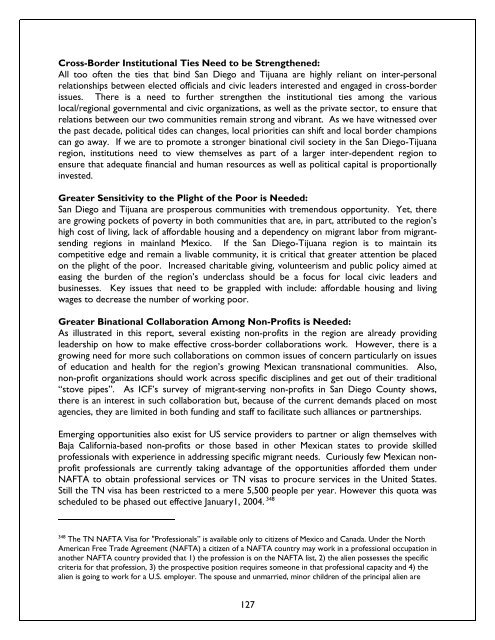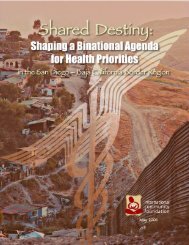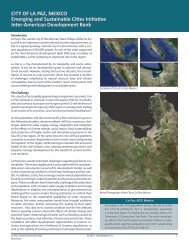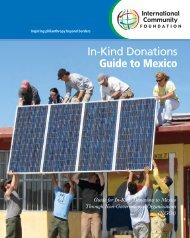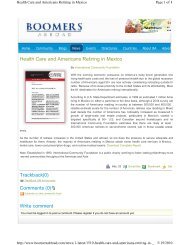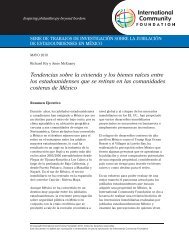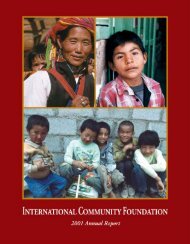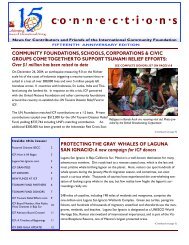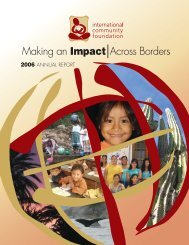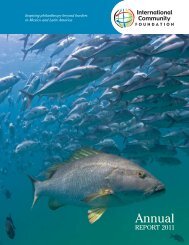Blurred Borders - International Community Foundation
Blurred Borders - International Community Foundation
Blurred Borders - International Community Foundation
Create successful ePaper yourself
Turn your PDF publications into a flip-book with our unique Google optimized e-Paper software.
Cross-Border Institutional Ties Need to be Strengthened:<br />
All too often the ties that bind San Diego and Tijuana are highly reliant on inter-personal<br />
relationships between elected officials and civic leaders interested and engaged in cross-border<br />
issues. There is a need to further strengthen the institutional ties among the various<br />
local/regional governmental and civic organizations, as well as the private sector, to ensure that<br />
relations between our two communities remain strong and vibrant. As we have witnessed over<br />
the past decade, political tides can changes, local priorities can shift and local border champions<br />
can go away. If we are to promote a stronger binational civil society in the San Diego-Tijuana<br />
region, institutions need to view themselves as part of a larger inter-dependent region to<br />
ensure that adequate financial and human resources as well as political capital is proportionally<br />
invested.<br />
Greater Sensitivity to the Plight of the Poor is Needed:<br />
San Diego and Tijuana are prosperous communities with tremendous opportunity. Yet, there<br />
are growing pockets of poverty in both communities that are, in part, attributed to the region’s<br />
high cost of living, lack of affordable housing and a dependency on migrant labor from migrantsending<br />
regions in mainland Mexico. If the San Diego-Tijuana region is to maintain its<br />
competitive edge and remain a livable community, it is critical that greater attention be placed<br />
on the plight of the poor. Increased charitable giving, volunteerism and public policy aimed at<br />
easing the burden of the region’s underclass should be a focus for local civic leaders and<br />
businesses. Key issues that need to be grappled with include: affordable housing and living<br />
wages to decrease the number of working poor.<br />
Greater Binational Collaboration Among Non-Profits is Needed:<br />
As illustrated in this report, several existing non-profits in the region are already providing<br />
leadership on how to make effective cross-border collaborations work. However, there is a<br />
growing need for more such collaborations on common issues of concern particularly on issues<br />
of education and health for the region’s growing Mexican transnational communities. Also,<br />
non-profit organizations should work across specific disciplines and get out of their traditional<br />
“stove pipes”. As ICF’s survey of migrant-serving non-profits in San Diego County shows,<br />
there is an interest in such collaboration but, because of the current demands placed on most<br />
agencies, they are limited in both funding and staff to facilitate such alliances or partnerships.<br />
Emerging opportunities also exist for US service providers to partner or align themselves with<br />
Baja California-based non-profits or those based in other Mexican states to provide skilled<br />
professionals with experience in addressing specific migrant needs. Curiously few Mexican nonprofit<br />
professionals are currently taking advantage of the opportunities afforded them under<br />
NAFTA to obtain professional services or TN visas to procure services in the United States.<br />
Still the TN visa has been restricted to a mere 5,500 people per year. However this quota was<br />
scheduled to be phased out effective January1, 2004. 348<br />
348 The TN NAFTA Visa for "Professionals” is available only to citizens of Mexico and Canada. Under the North<br />
American Free Trade Agreement (NAFTA) a citizen of a NAFTA country may work in a professional occupation in<br />
another NAFTA country provided that 1) the profession is on the NAFTA list, 2) the alien possesses the specific<br />
criteria for that profession, 3) the prospective position requires someone in that professional capacity and 4) the<br />
alien is going to work for a U.S. employer. The spouse and unmarried, minor children of the principal alien are<br />
127


